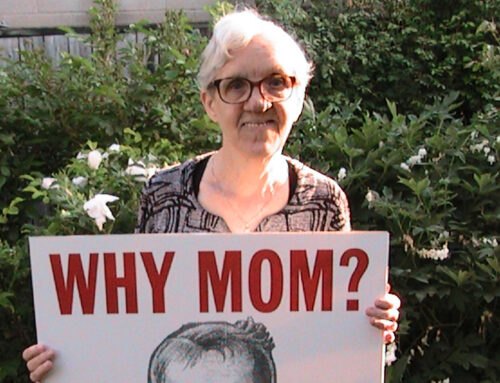The problem of giving witness counter to one’s beliefs is as old as mankind. Each generation has to choose between expediency and principle according to the circumstances in which it finds itself.
History seems to show that most people incline towards expediency and compromise, leaving the defence of principle to the few. Yet unless the few manage to garner enough support at one time or another to re-assess the validity of basic principles, society would disintegrate. The fact that somehow, throughout history, faith, hope and love have survived, ought to encourage everyone. But it is not a guarantee that these virtues cannot perish in our own society – even if only temporarily.
The litmus test of our own culture, I am convinced, is our attitude towards abortion or the killing of pre-born babies. Already our own Canadian society has co-operated with this evil in some form or another for over 20 years. Hence an examination of conscience is in order. To facilitate such an enquiry one may begin with the one religious faith community which is on record as rejecting abortion outright, the Roman Catholics.
Jean Chretien
In honour of its one hundredth anniversary, the Edmonton Catholic School System held the first Western Canadian Catholic Education Conference with the theme “Celebrate our Heritage for the Future.” The November 1988 Conference attracted nearly 3,000 participants from across Canada. Keynote speaker Jean Chretien, in explaining why he was at a religious conference, noted that “we share values as Roman Catholics and it is difficult to keep our values and our faith without education in that faith.” (Prairie Messenger. December 5, 1988)
Now, in 1980 and 1981, Mr. Chretien was Justice Minister under Prime Minister Trudeau, responsible for piloting a new Charter of Rights and Freedoms through a series of amendments. Despite numerous requests, he steadfastly resisted any proposals to change Section 7 of the Charter, guaranteeing life, liberty and security of person, to include protection for the pre-born. No such protection, therefore, was enacted with the result that the abortion holocaust has continued unabated. Mr. Chretien, meanwhile, has never given the slightest indication of regret, despite the fact that his action was totally contrary to the Catholic education he praised in 1988. Since 1981, whenever someone reminds him of it, he has been indignant and defiant.
Even when the memory of his disgraceful action was still vivid, few people seemed to care. Very shortly after the Charter had become part of a new Canadian constitution, the organizers of the Christian Culture series at a Catholic institute in Windsor, Ontario, bestowed upon Mr. Chretien their prestigious medal. Protestors, who were present at the ceremony were denounced as “fanatics.” Today many are promoting Mr. Chretien as a future party leader and, perhaps, prime minister.
Stephen Lewis
Another prominent speaker at the Edmonton Conference was Stephen Lewis, formerly leader of the Ontario NDP and former Canadian ambassador to the United Nations. Mr. Lewis is not a Catholic but a non-religious Jew. Education for the future, he thought, should emphasize disarmament, the causes of poverty, apartheid and the Holocaust, the environment and finally, the study of AIDS.
Mr. Lewis’ selection of social justice issues did not include any of the other modern assaults on the family such as permissive morals, easy divorce, homosexuality, contraceptives, pornography, surrogate wives, etc., nor attacks on human life, such as abortion, infanticide and euthanasia. The reason is that he and his wife are among Canada’s leading champions of so-called “reproductive choice.” Lewis was the first Canadian politician to propose legalizing the killing of pre-born babies (Ontario Legislature, 1965). His wife, who writes under her maiden name, Michelle Landsberg, pours her venom on pro-life causes and people whenever she has the opportunity. Both husband and wife are admirers of Henry Morgentaler.
Mr. Lewis has also been invited to speak at a conference held under the auspices of Ontario’s Durham Separate School Board (north-east of Toronto). He and other committed pro-abortionists such as the present leader of the Ontario NDP, Bob Rae, have been invited to similar conferences in the past. Needless to say, pro-abortionists indignantly deny that they are pro-abortion; they merely defend every woman’s “right” to kill her unborn baby, if so desired.
Why do Catholic School Boards and Catholic Teachers’ Associations invite a Jean Chretien who refused to help protect innocent life, or a Stephen Lewis who puts no value in pre-born life at all? Granted, these men are prominent politicians. Indeed, both are idols of the media. But why is it that nobody mentions their pro-abortion attitude?
Someone may answer that most people simply are not aware of a politician’s background. But this response only avoids the issue. After all, a speaker’s record is checked before the invitation is sent. And if a particular concern did agitate people’s mind, little time would be lost in making an issue of it.
Today, for example, nobody who has a record of blatant public anti-Semitism or racism will get elected to a public office. But to be pro-abortions seems to be regarded as much less of an offence, if an offence at all, even by those who strongly, perhaps even vehemently, object to it as a colossal scandal. How do we know this? Because social intercourse with politicians who are known by everybody to be pro-abortion continues without interruption at the highest level.
Community
The desire to remain fully part of the community and to share its endeavours and honours recognized by all is so strong – reinforced by a kind of horror at the thought of being “on the outside” – that leaders in the Catholic community have been unable or unwilling to even contemplate such a possibility. Take, for example, Cardinal Carter’s annual charity dinner in Toronto.
For two years, 1986 and 1987, pro-life picketers marched up and down in the late October cold while several thousand clergy and laity streamed into the Toronto Convention Center for a delicious roast-beef dinner. The picketers were there to protest the presence of Ontario Premier David Peterson. In 1986, the Premier had reneged on his promise to close the Morgentaler abortuary. In 1987, after he won a landslide electoral victory, he appointed ardent pro-abortionist Elinor Caplan as his new Minister of Health with the full knowledge that wider access to abortion would be a priority.
On October 27, 1988 there were no picketers outside the Convention Centre, although Premier Peterson had been invited again. Campaign Life Coalition members were preoccupied with the federal election called for November 21. Having received a free ticket, I decided to observe instead of to protest.
The Cardinal gave a forceful little speech. In matters ecclesiastical he shunned titles such as liberal or neo-conservative, he said, summing up his own stand as the result of having “the habit of facing reality.”
In matters of the larger community, he deeply believed in the importance of good community relations, he stated, and, therefore, in co-operating whenever possible. He spoke of the “most difficult decision” of his ten-year tenure as Toronto’s Archbishop. Friends and officials of the United Way asked him to reconsider the decision of his predecessor in 1976 to withdraw the Catholic community from the United Way because Planned Parenthood had been added as a beneficiary agency. When he discovered they were unwilling to drop PP, he declined. The Cardinal told the 2,300 strong gathering, which included Toronto’s Catholic hierarchy and all the mayors and reeves of greater Toronto’, many municipalities as well as the Premier of the province, “we just don’t kill.” He noted that “strong and uncompromising leadership is our hallmark.”
Mr. David Peterson, in his brief reply on behalf of the Province, somewhat jocularly noted that Sunday shopping (vigorously opposed by the Catholic Church and detested by many) would be realized shortly. He concluded by expressing his sincere admiration for His Eminence’s outstanding moral leadership in the community.
After the pleasantries and further amiable chit-chat over coffee, the dinner was declared a success and everyone went home satisfied, prepared to carry on as before. Inevitably one wonders about the kind of witness rendered her by and within the Catholic community.
Premier Peterson is well known for his pro-abortion stand. His government is committed to making abortion universally acceptable in the province. Over the previous 12 months his Minister of Health has opened a dozen “accredited” killing facilities for preborn babies, usually under the guise of women’s health centres, at the cost of millions of dollars at the time when many hospitals are closing down beds for lack of funds. Toronto today, has three fully government subsidized private killing centres, including Morgentaler’s. Clients’ fees are partly paid for by OHIP. The rest is extra-billed, prohibited by law, but tolerated for the abortion industry.
The Cardinal, on the other hand, is known as an outspoken opponent of abortion. The strength of his moral leadership comes in large part from his vigorous public letters opposing this new form of barbarism, letters not always well received by those members of his own clergy who have belittled the abortion issue in the past. Yet a representative segment of the diocese is invited to attend the fund-raising banquet together with a pro-abortion Premier as if there is not a cloud on the horizon. The one who opposes abortion wines and dines the other who, in turn, suitably hands over his expected donation for a good cause. Perhaps, too, the dinner was an opportunity for contacts between the representatives of church and state for some future cooperation on some other issue. Then all go home.
Message
One must assume that His Eminence does not agree that inviting an abortion-promoting premier weakens the pro-life position. The picketers of the previous two years have not changed his mind on the subject. Perhaps he believes that people can see through it all. However, it seems to me that symbolic gestures such as this one enhance the temptation to conform.
The message I received from the banquet was that for Catholics the duty to remain honoured and respected members of the political community must be maintained even if it means setting a different set of priorities in practice from what one knows is desirable according to theory or faith or theology. Apparently one must adapt and be realistic. Realism seems to mean learning to live with the inevitable.
The message I thing Premier Peterson received was that the general behaviour, even of those who claim they disapprove of abortions, is such that there are no notable, not even social, consequences attached to being pro-abortion. Life goes on uninterruptedly. There will be protests but only by “fanatics.” These are people who do not, or will not, accept secularism’s refusal to distinguish between vice and virtue (which it regards as inventions of private morality anyway) nor accept its decision that tolerance is to be the only virtue, one which must be accepted by society as overruling all other considerations.
Modern tolerance demands polite broad smiles, preferably with a mouthful of perfectly-formed white teeth, in the face of warped notions and outrageous acts. Even frowning is treated as an insult, while non-cooperation is altogether unthinkable.
Tolerance in radical isolation from its moral and Christian roots is the new civic religion of the West. This new religion threatens to swallow and emasculate the revealed religion of the past.
To be continued.




